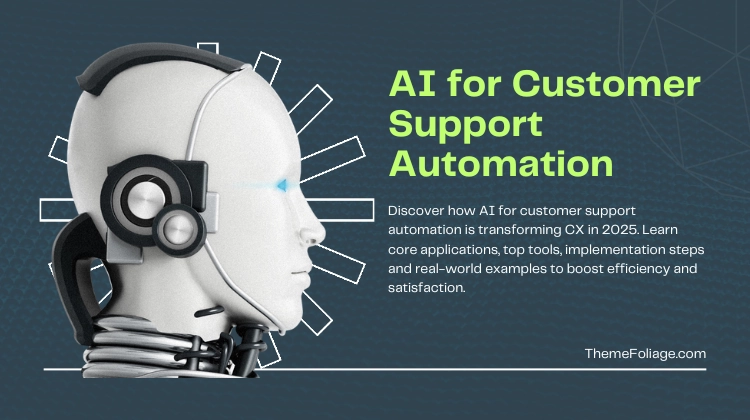Customer expectations have never been higher. They demand instant answers, personalised experiences and 24/7 availability. In 2025, AI for customer support automation is no longer a luxury, it’s essential.
By leveraging machine learning, natural language processing and predictive analytics, businesses can automate routine support tasks, deflect tickets, and empower human agents to focus on high-value issues.
According to Kodif AI, by 2025 AI will power 95% of all customer interactions, enabling seamless, scalable support across channels.
Meanwhile, ServiceNow reports that modern AI-enabled teams resolve issues 44% faster, driving higher satisfaction and lower costs.
Why Automate Customer Support with AI?
Traditional support models struggle under high ticket volumes, leading to slow response times and frustrated customers. AI changes the game by:
- 24/7 Availability: AI chatbots and virtual agents never sleep—they answer FAQs, process returns and guide users through self-service portals around the clock.
- Instant Resolution: AI deflects up to 80% of common queries, drastically reducing ticket backlog and wait times.
- Personalised Assistance: AI analyses user history and context to offer tailored solutions, boosting satisfaction and loyalty.
- Cost Efficiency: Automating repetitive tasks lowers headcount requirements and reduces average cost per resolution by up to 30%.
- Scalability: As ticket volumes surge—during product launches or seasonal peaks—AI scales instantly, without proportional increases in staffing.
Core Applications of AI in Customer Support Automation
1. Conversational Chatbots and Voice Assistants
AI-powered chatbots handle live conversations on websites, mobile apps and messaging platforms. Advanced bots, such as Intercom’s Fin, understand context, escalate complex issues to humans, and even execute account-specific tasks like order tracking.
2. Automated Ticketing and Routing
Tools like Zendesk AI and Freshdesk’s Freddy automatically classify, prioritise and assign incoming tickets. They use sentiment analysis and intent detection to ensure critical issues reach the right agent immediately.
3. Agent Assist and Knowledge Management
AI copilots surface relevant knowledge-base articles, suggest responses and summarise past interactions for agents in real time. This cuts resolution times and ensures consistency, especially for new hires.
4. Sentiment Analysis and Escalation
Natural language processing platforms such as MonkeyLearn monitor email, chat transcripts and social mentions. They flag negative sentiment, automatically opening high-priority support tickets to prevent churn.
5. Automated Follow-Up and Feedback
AI workflows in tools like Kommunicate automatically send CSAT surveys, collect feedback and generate support workflows based on responses. This continuous feedback loop drives service improvement.
6. Predictive Support and Proactive Outreach
Predictive analytics identify customers at risk—based on usage drops or repeated product errors—and trigger personalised outreach. Early intervention reduces churn and increases upsell opportunities.
Top AI Tools for Customer Support Automation (2025)
Note: Prices may change as providers update plans.
| Tool | Function | Pricing (USD) |
|---|---|---|
| Kommunicate | No-code chatbot builder, ticket automation | From $40/month; Pro $200/month |
| Zendesk AI | Ticket routing, AI agent assist | From $49/user/month |
| Intercom (Fin) | Conversational chatbot, live chat AI | From $74/month |
| Freshdesk Freddy | Automated ticketing, agent suggestions | From $18/month |
| MonkeyLearn | Sentiment analysis, feedback automation | From $299/month |
| Ada | Multilingual chatbot, self-service portals | From $99/month |
| Yuma.ai | Context-aware support assistant | From $39/month |
| Salesforce Agentforce | AI-driven email triage & case routing | From $25/user/month |
Real-World Example
A mid-market SaaS provider integrated Kommunicate and Zendesk AI into its support stack. Within three months:
- Chatbot deflection rose from 10% to 45%, cutting ticket volume by 40%.
- Average first response time dropped from 4 hours to under 30 minutes.
- CSAT scores climbed from 82% to 91%.
- Support costs fell by 27% thanks to reduced manual workload.
This case underscores how AI can deliver rapid ROI and transform support efficiency.
How to Implement AI Customer Support Automation
Audit Your Support Data: Gather historical tickets, chat logs and call transcripts. Clean and categorise data to train AI models accurately.
Define Automation Goals: Clarify objectives: deflect X% of tickets, reduce first response time to Y minutes, improve CSAT by Z points.
Choose the Right Tools: Select platforms that integrate with your CRM, helpdesk and messaging channels. Prioritise no-code or low-code solutions if technical resources are limited.
Train and Test AI Models: Use past interactions to train chatbots and ticket-routing engines. Run pilot tests on a subset of traffic and refine intents and responses.
Deploy in Phases: Start with FAQ automation and routing. Gradually expand to sentiment analysis, agent assist and predictive support.
Monitor Performance Metrics: Track deflection rates, response times, resolution times and CSAT. Use AI analytics dashboards to identify improvement areas.
Iterate and Scale: Continuously retrain models with new data. Expand AI coverage to new channels—voice, social media, in-app messaging.
Challenges and Considerations
Data Privacy and Compliance: Ensure consent for chat transcripts and personal data. Comply with GDPR, CCPA and industry regulations.
Maintaining Brand Voice: AI responses must reflect brand tone. Implement human review of key messages and regularly update language models.
Avoiding Over-Automation: Balance self-service with human fallback. Complex, emotionally sensitive issues should route to live agents.
Integration Complexity: Multiple systems can create silos. Choose tools with robust APIs and pre-built connectors.
Quality of Training Data: Poorly categorised or biased data leads to inaccurate automation. Invest time in data cleaning and labelling.
Final Thoughts
AI for customer support automation is a strategic imperative in 2025. By automating routine tasks, personalising interactions and empowering agents with real-time insights, businesses can deliver faster, more efficient and more satisfying support experiences.
The journey starts with clear goals, the right tools and quality data. Begin by deflecting simple queries, then expand AI capabilities into routing, sentiment analysis and predictive outreach. Iterate constantly, AI gets smarter with every interaction.
In the future, truly exceptional support will be defined by seamless human-AI collaboration. Automation handles the repetitive; your teams focus on empathy, creativity and complex problem-solving. That’s the evolution AI brings to customer support.



